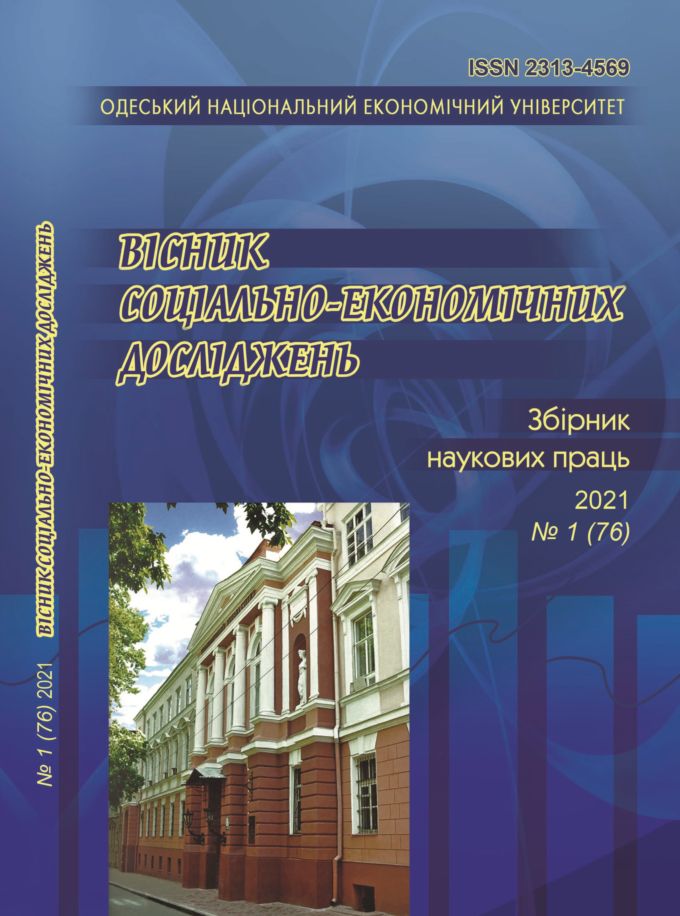THEORETICAL BASIS FOR THE BALANCED DEVELOPMENT OF MICROECONOMIC SYSTEMS IN THE CONDITIONS OF DIGITAL TRANSFORMATIONS
DOI:
https://doi.org/10.33987/vsed.1(76).2021.76-88Keywords:
microeconomic system, balanced development, digital transformation, globalization, patterns, factors, essence, distinctive features, functionsAbstract
The article determines the essence, distinctive features and functions of the balanced development of microeconomic systems under the influence of globalization phenomena and digital transformations. The theoretical and methodological basis of the study was formed by the evolutionary-cyclical theory and the theory of dynamic equilibrium, the main approaches to balanced (sustainable) development. In the course of the study, methods of dialectical cognition, generalization and scientific abstraction were used, the use of which made it possible to form the theoretical foundations of the balanced development of microeconomic systems, taking into account globalization, informatization and digital transformations. The factors of positive and negative influence of globalization processes on the microeconomic systems activity have been established. A coherent relationship between the modern patterns of microeconomic systems development and infocommunication technologies and services they use, was revealed, taking into account the created synergistic effect, which makes it possible to determine the influence of infocommunication technologies on the digital literacy of society and the development of digital economy by taking into account their availability and intensity of use. It is noted that the balanced development of microeconomic systems is a dynamic category aimed at optimizing the process of achieving balanced economic, social and environmental development through the implementation of the dynamic relationship of new functions and qualitative characteristics of systems. It has been determined that the balanced development of microeconomic systems is characterized by excellent features, in particular: economic, ecological, energy and social. The aggregate of microeconomic systems functions, implemented by them in the context of sustainable development and necessary for solving external and internal problems of ensuring high-quality and stable development in the long term, maintaining a dynamic balance and relying on their own capabilities, is characterized. Based on the generalization of existing theoretical approaches and basic provisions of the sustainable development concept at different levels of the hierarchy, taking into account globalization, informatization and digital transformations, a theoretical basis for the sustainable development of microeconomic systems was further developed, based on the establishment of the characteristic distinctive features of the balanced development of enterprises, the activities of which are investigated from the standpoint of their implementation of the totality economic, social and environmental functions.
References
Derkach, М. І. (2010). Evolution of economic theory of sustainable development [Evoliutsiia ekonomichnoi teorii staloho rozvytku], Zbirnyk naukovykh prats LNTU, Vyp. 7 (28), Ch. 1, s. 144–159 [in Ukrainian]
Moroz, O. V. (2020). Institutional support for national plans of sustainable development and anticrisis management [Instytutsionalne zabezpechennia natsionalnykh planiv staloho rozvytku ta antykryzovoho upravlinnia], Socio-economic research bulletin, Vìsnik socìal’no-ekonomìčnih doslìdžen’ (ISSN 2313-4569), No. 2 (73), s. 9–26. DOI: https://doi.org/10.33987/vsed.2(73).2020.9-26 [in Ukrainian]
Sidelnikova, L. P. (2018). Tax mechanism for sustainable development of the state and regions [Podatkovyi mekhanizm zabezpechennia staloho rozvytku derzhavy ta rehioniv], Sotsialno-ekonomichnyi rozvytok rehioniv v konteksti mizhnarodnoi intehratsii, No. 29 (18), T. 2, s. 50–55 [in Ukrainian]
Grosul, V. А. (2012). Theoretical approaches to determining the essence of enterprise sustainable development [Teoretychni pidkhody shchodo vyznachennia sutnosti stiikoho rozvytku pidpryiemstva], Stalyi rozvytok ekonomiky, No. 7, s. 104–107 [in Ukrainian]
Ivanchuk, К. О. (2014). Sustainable economic development of the enterprise: theoretical substantiation [Stiikyi ekonomichnyi rozvytok pidpryiemstva: teoretychne obhruntuvannia], Ekonomika rozvytku, No. 3, s. 84–88. Retrieved from: http://nbuv.gov.ua/UJRN/ecro_2014_3_19 [in Ukrainian]
Doysan-Korovyonkova, N. V. (2014). Sustainable enterprise development as a process and economic phenomenon: theoretical aspects [Stalyi rozvytok pidpryiemstva yak protses ta ekonomichne yavyshche: teoretychni aspekty], Socio-economic research bulletin; Vìsnik socìal’noekonomìčnih doslìdžen’ (ISSN 2313-4569), Vyp. 2 (53), s. 48–55. Retrieved from: http://nbuv.gov.ua/UJRN/Vsed_2014_2_10 [in Ukrainian]
Prokhorova, V. V. (2010). Management of enterprise sustainable development as a basis of transorption processes [Upravlinnia stiikym rozvytkom pidpryiemstva yak osnova transorfmatsiinykh protsesiv], Visnyk ekonomiky transportu i promyslovosti, No. 29, s. 364–370 [in Ukrainian]
Bezpartochnyi, М. G. (2019). Ensuring sustainable economic development of state enterprises [Zabezpechennia stiikoho ekonomichnoho rozvytku derzhavnykh pidpryiemstv], Innovatsiina ekonomika, No. 5-6, s. 75–79. DOI: 10.37332/2309-1533.2019.5-6.9 [in Ukrainian]
Demianchuk, M., Bezpartochnyi, M., Filipishyna, L., Živitere, M. (2021). The model of achieving a balanced balance between economic efficiency and ecological-social responsibility of digitalized enterprise. Journal of Optimization in Industrial Engineering, Vol. 14, Issue 1, pp. 63–70. DOI: https://doi.org/10.22094/JOIE.2020.677817.
Knyazeva, O. A., Doysan-Korovyonkova, N. V. (2015). Reorientation of the telecommunication enterprise on sustainable type of development [Pereoriientatsiia telekomunikatsiinoho pidpryiemstva na stalyi typ rozvytku], Ekonomika. Menedzhment. Biznes, No. 2, s. 117–122 [in Ukrainian]
Guseva, O. Yu., Khlevytska, T. B. & Martsenyuk, N. O. (2019). Theoretical and practical approaches to substantiation of strategic management tools of telecommunication enterprise sustainable development [Teoretychni ta praktychni pidkhody do obhruntuvannia instrumentariiu stratehichnoho upravlinnia stalym rozvytkom telekomunikatsiinoho pidpryiemstva], Ekonomika. Menedzhment. Biznes, No. 2 (28), s. 126–135. DOI: 10.31673/2415-8089.2019.020126 [in Ukrainian]
Kolotiy, V. О. (2011). Peculiarities of trade enterprises sustainable development in the conditions of innovative activity intensification [Osoblyvist staloho rozvytku pidpryiemstv torhivli v umovakh aktyvizatsii innovatsiinoi diialnosti], Zbirnyk naukovykh prats Khmelnytskoho kooperatyvnoho torhovelno-ekonomichnoho universytetu. Retrieved from: http://www.nbuv.gov.ua/portal/soc_gum/Znphktei/2011_2/statti_2/koloti/koloti.htm [in Ukrainian]
Bernow, S., Klempner, B., Magnin, С. (2017). From ‘why’ to ‘why not’: Sustainable investing as the new normal. Retrieved from: https://www.mckinsey.com/industries/private-equity-and-principal-investors/our-insights/from-why-to-why-not-sustainable-investing-as-the-new-normal.
Eccles, R. G., Kastapeli, M. D. (2018). The investing enlightenment: how principle and pragmatism can create sustainable value through ESG. Retrieved from: http://www.statestreet.com/content/dam/statestreet/documents/Articles/The_Investing_Enlightenment.pdf.
Rohov, H. K. (2018). The system of financial mechanisms for corporate sustainable development: the concept components [Systema finansovykh mekhanizmiv korporatyvnoho staloho rozvytku: skladovi kontseptsii], Socio-economic research bulletin; Vìsnik socìal’noekonomìčnih doslìdžen’ (ISSN 2313-4569), No. 3 (67), s. 222–229. DOI: https://doi.org/10.33987/vsed.3(67).2018.222-229 [in Ukrainian]
Downloads
Published
Issue
Section
License
Copyright (c) 2021 Socio-Economic Research Bulletin

This work is licensed under a Creative Commons Attribution 4.0 International License.






